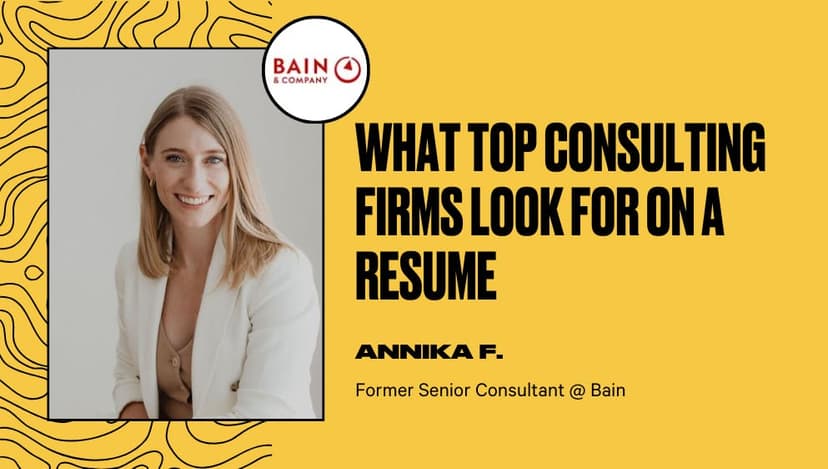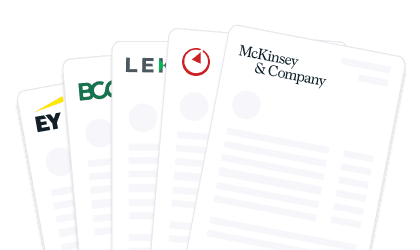Healthcare Case Study Interview Guide: Frameworks, Tips, & Examples
Healthcare cases are tricky. This 2025 guide breaks down how to prep for consulting interviews that test your thinking, structure, and industry insight.
Posted June 13, 2025

Join a free event
Learn from top coaches and industry experts in live, interactive sessions you can join for free.
Table of Contents
Getting ready for a healthcare consulting interview? Here’s what to expect: real client scenarios, fast decisions, and firms like McKinsey, IQVIA, and ClearView testing how you break down complex healthcare problems. But with the right frameworks and examples, you can walk in ready to impress.
What You Need to Know about the Healthcare Industry
You don’t need a PhD in healthcare to crack these interviews, but you do need to speak the language. Here’s a quick breakdown of the core sectors and players you’ll encounter in case interviews.
- Pharmaceuticals – Drug discovery, clinical trials, and commercialization. Think Pfizer, Novartis, Merck.
- Medical Devices – Surgical equipment, diagnostic tools, wearable tech. Think Medtronic, Stryker.
- Payers (Managed Care) – Health insurance companies. Think UnitedHealth, Anthem, Aetna.
- Providers – Health systems and hospitals. Think HCA, Mayo Clinic, Kaiser Permanente.
To succeed in healthcare consulting, you need more than just a surface-level understanding of the industry, you need to know who the key stakeholders are, what they care about, and how they influence one another.
- Patients – End users of healthcare services.
- Providers – Doctors, nurses, care teams.
- Payers – Insurance firms or public entities footing the bill.
- Pharma/Device firms – Supplying treatments and technologies.
- Government – Regulating pricing, safety, and access.
Great candidates can clearly explain how these stakeholders interact. For example, how a payer’s reimbursement policy affects provider behavior, or how government regulation impacts a pharmaceutical firm’s pricing strategy. If you can speak to these relationships with confidence and clarity, you’ll immediately stand out in the interview room.
Top Industry Trends
Firms want to know you’re aware of what’s changing. Here are trends worth referencing in interviews:
- Telehealth – Virtual care adoption surged post-COVID.
- Biosimilars – Cost-saving drug alternatives reshaping pharma competition.
- Outpatient Shift – More care is moving outside hospitals.
- Value-Based Care – Payment tied to outcomes, not volume.
- AI & Digital Health – NLP, machine learning, and connected devices are transforming care delivery.
From strict regulations to tangled stakeholder dynamics, healthcare is a uniquely complex industry, and firms want to know you can keep up.
You don’t need to know everything. But you do need to show you understand the fundamentals: who the key players are, how they interact, and what challenges the industry is facing. If you can explain these clearly and apply them to real-world problems, you’re already ahead of most candidates.
8 Practice Healthcare Consulting Cases (With Focus Areas)
Use these to simulate real case interviews:
| Case | Firm | Focus |
|---|---|---|
| Pharma Acquisition Case | McKinsey | M&A strategy in pharma |
| Drug Pricing Case | BCG | Pricing a new drug in U.S. market |
| Inhaled Insulin Revenue Forecast | ClearView | Market sizing + revenue target |
| AML Therapy Assessment | ClearView | Quantitative analysis in oncology |
| Medical Consumables Market Sizing | L.E.K. | Estimating B2B product usage |
| Biotech Market Entry (Ear Infection Drug) | Health Advances | Market opportunity and clinical unmet need |
| Surgical Robot Expansion | ZS Associates | Product launch in new hospitals |
| Payer Mix Optimization | IQVIA | Managed care revenue strategy |
Healthcare Case Study Examples
Case #1. Digital Transformation for a Global Healthcare System
Challenge: The organization faced challenges with outdated legacy systems that hindered operational efficiency and the delivery of high-quality patient care.
Solution: PwC partnered with the healthcare system to implement a comprehensive digital transformation strategy. This involved overhauling existing IT infrastructures, integrating advanced technologies, and streamlining processes to enhance agility and responsiveness across the organization.
Outcome: The transformation led to improved patient experiences, more efficient operations, and a stronger foundation for future innovations in healthcare delivery.
Read more here.
Case #2. Yuma Regional Medical Center: Transforming Emergency Department Operations
Challenge: Yuma Regional Medical Center faced prolonged patient wait times and inefficiencies in their Emergency Department (ED), leading to decreased patient satisfaction and increased operational
Solution: In collaboration with Vizient, the medical center undertook a comprehensive overhaul of their ED processes. This included redesigning storing and stocking procedures, implementing a new approach to filling preference and case carts, and optimizing workflow sequencing for physicians and nurses.
Outcome: These initiatives led to a significant reduction in patient length of stay during peak seasons by nearly an hour. Additionally, the average patient time in the ED was cut from almost six hours to under three. The efficiency gains also resulted in a 47% reduction in overtime hours and a 44% drop in agency personnel costs.
Read more here.
Case #3. Bloodless Management of Severe Anemia in a Jehovah’s Witness Patient
Patient Profile: A 78-year-old male Jehovah’s Witness presented with fatigue, weakness, and a four-week history of maroon-colored stools.
Clinical Challenge: The patient had a critically low hemoglobin level of 4.1 g/dL upon admission, which further dropped to 3.1 g/dL by the third day. His condition was complicated by a recent pulmonary infection, atrial fibrillation, and non-ischemic cardiomyopathy. As a Jehovah’s Witness, he declined blood transfusions, necessitating alternative treatment strategies.
Treatment Strategy: The medical team implemented a comprehensive bloodless management plan, including:
- Discontinuation of anticoagulant therapy (Xarelto) upon admission.
- Administration of daily intravenous iron sucrose, folate, vitamin B12, and erythropoietin to stimulate red blood cell production.
- Minimization of blood draws by using neonatal phlebotomy tubes to reduce iatrogenic blood loss.
- Procurement of a hemoglobin-based oxygen carrier (Sanguinate) under compassionate use provisions as a precautionary measure, although it was ultimately not required.
Outcome: The patient responded well to the treatment regimen, with his hemoglobin level rising to 5.1 g/dL by discharge on day seven. He remained asymptomatic throughout his hospital stay and continued outpatient therapy, achieving a hemoglobin level of 11.1 g/dL after three weeks.
Read more here.
The 7 Tactical Steps to Solve a Healthcare Case Interview
1. Get the Case Objective Right
Start by listening carefully to the background info. Take notes. Then clarify:
- Who’s the client?
- What’s the specific goal? (Grow revenue? Improve outcomes? Enter a market?)
If you solve the wrong problem, nothing else matters.
2. Ask Smart, Focused Questions
You don’t get points for asking a lot of questions, you get points for asking the right ones. Prioritize questions that:
- Clarify terminology (e.g., "When you say 'payer mix'...")
- Reveal constraints (timelines, budgets, regulations)
- Surface hidden variables (e.g., competitor behavior or internal capabilities)
3. Summarize & Confirm
Before diving in, quickly paraphrase the case and restate the goal. Be clear, structured, and confident:
“So we’re advising a mid-sized device company exploring the diabetes market. They want to assess whether acquiring a new insulin patch tech makes commercial sense, is that correct?”
This is where you show communication clarity, not just content knowledge.
4. Build a Case-Specific Framework
Cookie-cutter frameworks won’t cut it here. Don’t throw a generic “market entry” or “profitability” structure at a biotech case and hope it sticks. Tailor your structure based on what you know about the healthcare space.
Ask yourself:
- What are the key success drivers in this case?
- How do payers, providers, and regulations influence outcomes?
- What clinical, operational, and financial risks need to be assessed?
Break it into 3–4 logical buckets. Then walk the interviewer through them confidently.
5. Lead the Case (Even in Interviewer-Led Formats)
In candidate-led cases, pick a framework bucket and start digging. For example:
“Let’s start with the market opportunity, specifically, patient population and reimbursement dynamics.”
In interviewer-led cases, don’t wait passively. Answer their questions, but also show initiative by linking each answer back to the broader case objective.
6. Nail the Quant — and Connect It to Strategy
When asked to do math (e.g., market sizing, pricing, cost breakdowns), slow down and talk out your assumptions:
“Let’s assume 1 million patients, 30% penetration, and $500 per treatment. That gives us a $150M revenue opportunity.”
More importantly: interpret the result.
- What does this number mean for the client?
- Does it justify investment, or is it a red flag?
7. Deliver a Sharp, CEO-Level Recommendation
At the end, give your recommendation like you’re briefing the boardroom.
Structure it like this:
- Clear Recommendation – “We recommend acquiring the insulin patch startup.”
- 3 Supporting Points – “The product meets an unmet clinical need, reimbursement is favorable, and the acquisition provides synergy with existing channels.”
- Next Steps – “We’d suggest a deeper technical due diligence and a payer feedback survey before final commitment.”
Even if your answer isn’t “right,” you’ll stand out for having a well-reasoned and structured conclusion.
Best Resources to Prep Smarter (Not Harder)
Work with a Coach Who Specializes in Healthcare Consulting
If you want personalized, fast-track prep, this is your unfair advantage. Work 1-on-1 with former consultants from Bain, McKinsey, ClearView, ZS, and other top firms! People who’ve sat on the other side of the interview table and know exactly what it takes to succeed.
Whether you're struggling with frameworks, math, or just want expert feedback on live mock cases, Leland coaches have helped hundreds of candidates land offers at firms. You'll get real-time, tactical coaching, and not generic feedback or cookie-cutter advice.
Industry Deep Dives
- Company 10-Ks (e.g., Medtronic, UnitedHealth)
- Pharma market outlook reports (IQVIA, Deloitte)
- NEJM Catalyst articles (on value-based care, digital health)
Behavioral & Fit Interviews
- Be ready for questions like “Why healthcare consulting?” and “Tell me about a time you solved a complex problem.”
- Use a simple structure: Situation → Task → Action → Result → Reflection
Bottom Line
Firms don’t expect you to be a doctor or biotech expert, but they do expect you to think like a consultant who gets healthcare. If you can frame problems clearly, think strategically, and communicate like a pro, you’ll stand out, no matter how technical the case gets.
Break Into Healthcare Consulting with Guidance from an Expert
If you’re hoping to enter the healthcare field from a consulting angle, there are plenty of ways your education and experience can help you ace the case study interviews that await you. In addition to the resources in this guide, you can also work with an expert one-on-one to prepare for the challenges ahead.
Our management consulting coaches have the training and expertise to guide you through the healthcare case study interview process. Working with a coach can help you solidify your exact career goals and how you can best present yourself and your hopes for your future career in upcoming consulting interviews.
FAQs
What’s the best way to prepare for a healthcare case study?
- Start by mastering the basics of the healthcare system and common business problems. Practice breaking down cases with a clear structure, and focus on how your solution impacts patient care, healthcare costs, and a program’s success.
Do healthcare consulting interviews differ from general consulting interviews?
- Yes. While the format is similar, healthcare consulting interviews often require more sector-specific knowledge, especially around health care organizations, policy, and reimbursement models. You’ll still be assessed on structured thinking and communication.
Should I expect in-person or virtual interviews?
- It depends on the firm. Many still conduct virtual interviews, but some may invite candidates for in-person rounds.
What kind of clarifying questions should I ask in a healthcare case?
- Ask about the payer-provider landscape, regulatory constraints, patient segments, and metrics used to evaluate high quality care or high performance. Strong clarifying questions help you frame the problem more accurately.
What frameworks actually work for healthcare cases?
- Forget memorized templates. What works is a flexible, problem-first process that adapts to the case. For example, when working with healthcare organizations, you might structure your framework around patient outcomes, payer incentives, operational capacity, and regulatory risk.
Browse hundreds of expert coaches
Leland coaches have helped thousands of people achieve their goals. A dedicated mentor can make all the difference.


























